People Skills for Managers A Definitive Guide
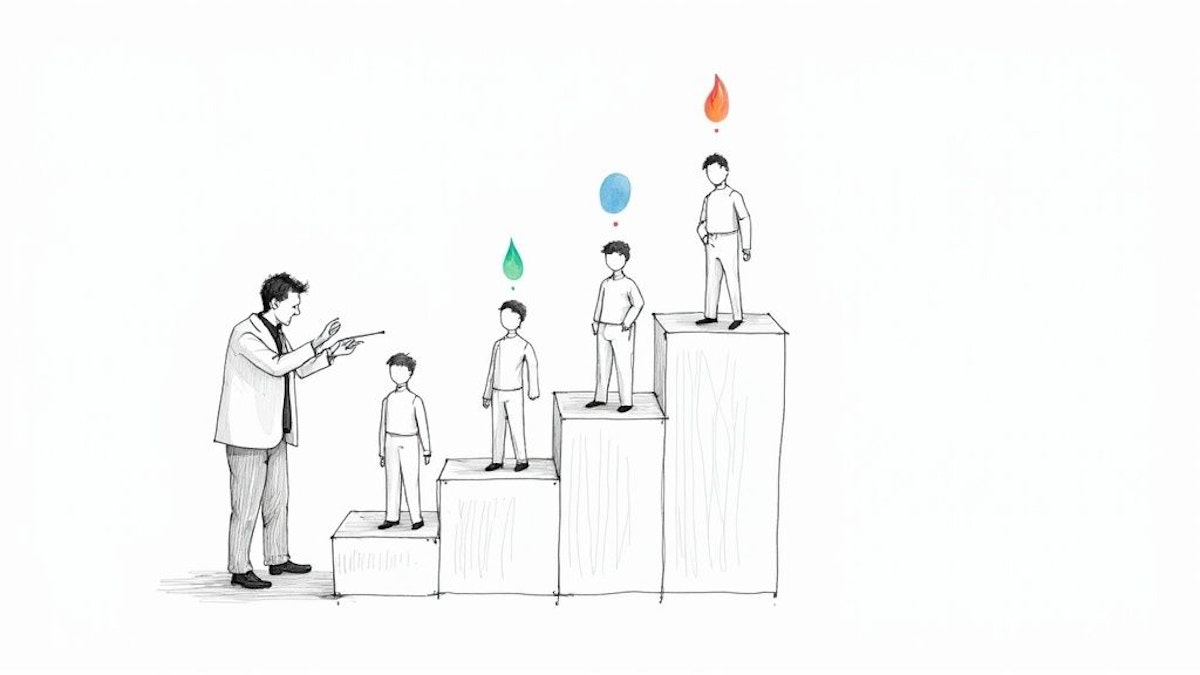
When we talk about people skills for managers, we’re really talking about the core abilities needed to lead a team effectively. This isn't just about being friendly; it's about mastering competencies like strategic communication, empathy, and motivation. These are no longer "soft skills"—they're hard requirements for keeping your business competitive and holding onto your best people.
Why People Skills Are No Longer a Soft Option
Technical skills can only get a manager so far. The old-school approach of focusing strictly on process and output just doesn't cut it anymore. Today's workplace needs leaders who can connect with their teams on a human level.
Think of a great manager like an orchestra conductor. They don't play every instrument, but their real talent lies in guiding, listening, and unifying a group of individual musicians to create something amazing together. That’s the heart of modern people management.
When managers have strong people skills, you see the results in black and white. Clear communication, genuine empathy, and knowing what makes a team tick—these things create a ripple effect of positive outcomes across the entire organization.
The infographic below shows just how much these skills impact critical business metrics like employee retention, productivity, and innovation.
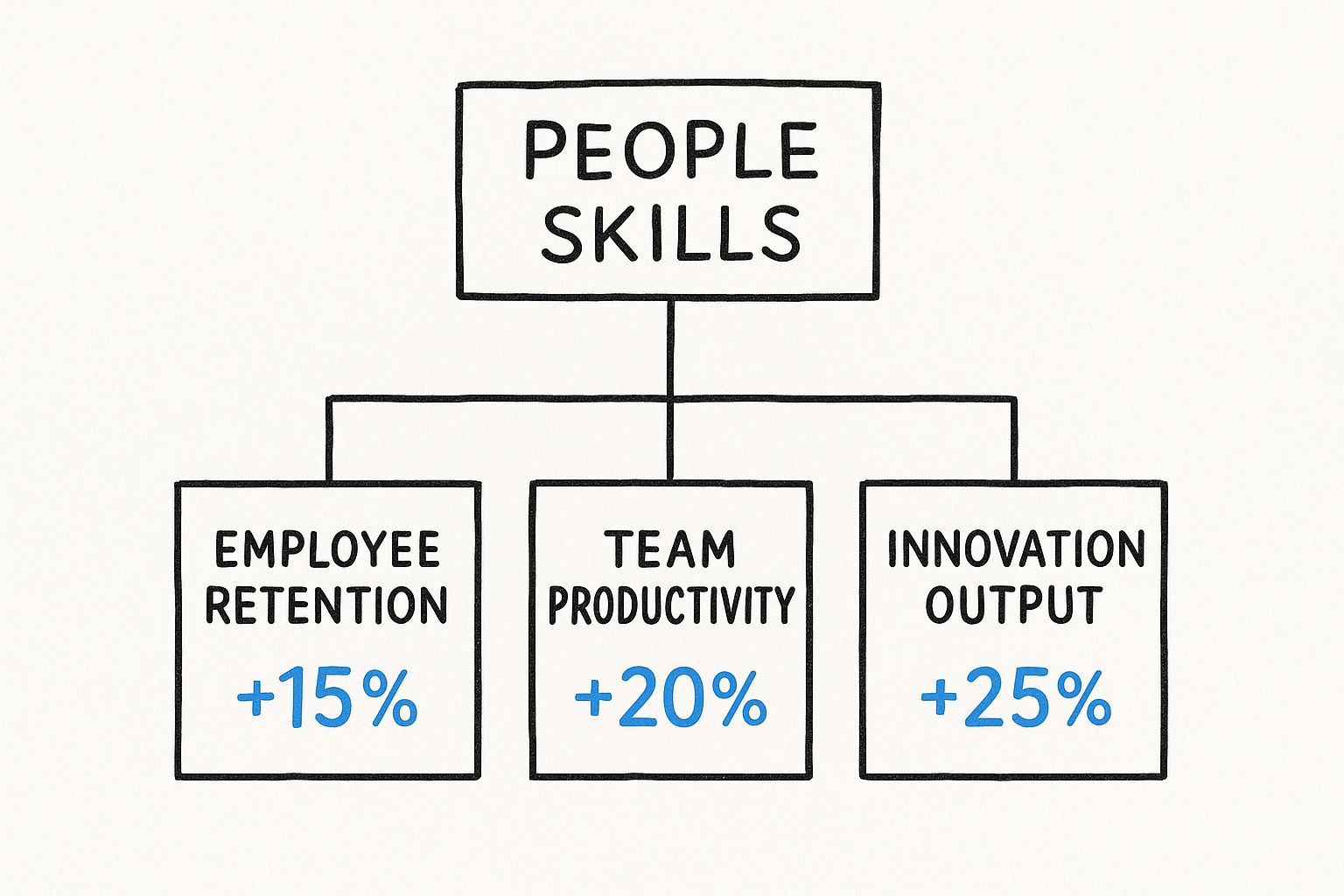
As you can see, investing in these competencies isn't just about making the office a nicer place to be. It’s a strategic move that directly boosts performance and fuels creativity.
The Shift Toward Human-Centered Leadership
The way we work is changing, and so are the skills required to lead. The World Economic Forum's Future of Jobs Report 2023 projects that analytical and creative thinking will be the most in-demand skills, while technology literacy and curiosity are also rising fast, underscoring the shift toward human-centric abilities. Companies are taking notice. A 2023 report by Go1 found that 66% of organizations now prioritize developing "power skills"—such as communication and leadership—in their leaders.
The table below illustrates this fundamental change in what we expect from our managers.
The Shift from Traditional to Modern Management Focus
| Traditional Management Trait | Modern People Skill | Impact on Team |
|---|---|---|
| Authority and Control | Influence and Empowerment | Fosters autonomy and ownership |
| Top-Down Directives | Collaborative Communication | Encourages innovation and shared goals |
| Process-Focused | People-Focused | Boosts morale, engagement, and retention |
| Reactive Problem-Solving | Proactive Coaching | Develops team skills and resilience |
| Annual Reviews | Continuous Feedback | Drives consistent growth and improvement |
This evolution from a command-and-control mindset to one of coaching and collaboration is what separates a good manager from a great one.
In an era where so much of our interaction is digital, mastering communication—especially email—is a huge advantage. Getting up to speed on essential email communication best practices is a perfect example of a modern leadership skill.
Ultimately, this global focus tells us one thing: a manager's ability to lead people is the single biggest driver of a team's success. These skills are what separate a struggling team from a high-performing one, directly shaping engagement, loyalty, and the company's ability to adapt and thrive.
The 4 Pillars of Truly Effective People Management
When we talk about "people skills," it can feel like a vague, fuzzy concept. But for a manager, these skills aren't just nice-to-haves; they're the foundation of everything you do. To make it more concrete, I like to think of them as four distinct pillars that hold up a successful team.
If any one of these is weak, the whole structure starts to feel unstable. These pillars are Communication, Empathy, Motivation, and Conflict Resolution.
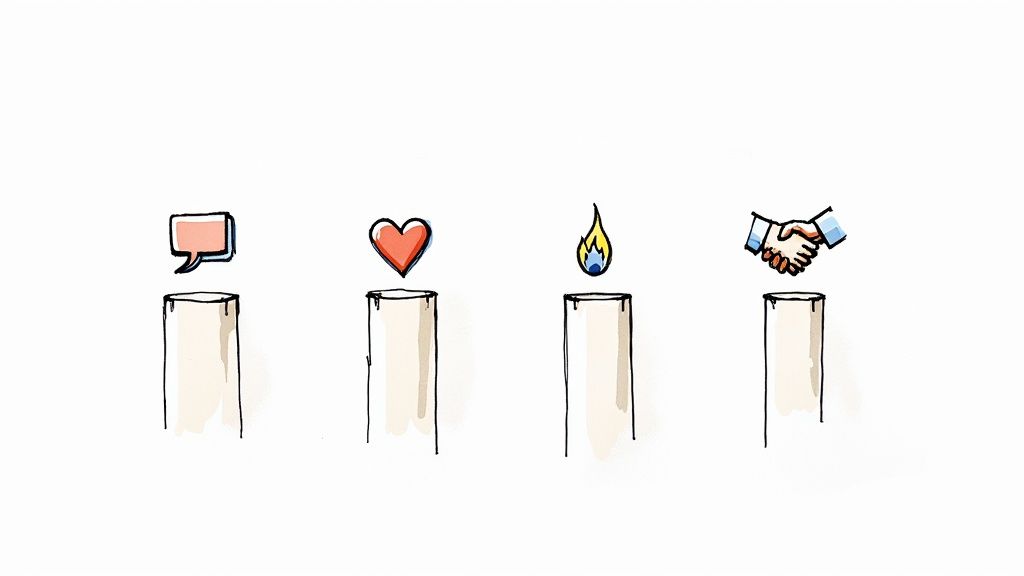
The good news? These aren’t personality traits you're born with. They are practical, learnable skills that separate the managers who just get by from the leaders who inspire. Nailing these is your ticket to building a team that’s not only high-performing but also resilient and genuinely engaged.
Communication: The Bedrock of Trust
Great communication is so much more than just sending clear emails or assigning tasks. Think of it as building a highway for information—it has to flow freely in both directions. The single most important part of this is active listening. That means you're not just waiting for your turn to talk; you're hearing the intent and meaning behind the words.
When you truly listen to your employees, they feel seen and respected. That feeling is what creates psychological safety, an environment where people aren’t afraid to voice a wild idea or, just as importantly, raise a red flag before a small problem becomes a big one.
According to a Gallup analysis, managers who hold regular meetings with their teams are three times more likely to have engaged employees. It's that consistent, open dialogue that builds a strong foundation, directly linking good communication to better business results.
Empathy: Seeing the Person Behind the Professional
Empathy is your ability to step into someone else's shoes and see the world from their perspective. In a management context, this is a game-changer. It's a huge piece of emotional intelligence and is key to forging real connections with your team. If you want to dig deeper, our guide on what emotional intelligence is in leadership is a great place to start.
An empathetic manager gets that every person on their team has a life outside of work, complete with unique challenges and personal goals. This understanding allows you to adapt your approach, offer the right kind of support, and make decisions that don't just look good on a spreadsheet but also feel right on a human level. The result is almost always higher morale and stronger loyalty.
Motivation: Fueling the Inner Drive
Sure, a paycheck and benefits matter. But the motivation that leads to exceptional work usually comes from somewhere deeper. A great manager is like a detective, figuring out what truly drives each person on their team—whether it's the satisfaction of mastering a new skill, the freedom of autonomy, or the feeling of contributing to something meaningful.
This isn't about giving rah-rah speeches. It’s about being intentional.
- Play to Their Strengths: Line up projects with what people are naturally good at and enjoy doing.
- Create Pathways for Growth: Give them real opportunities to learn, develop, and advance in their careers.
- Acknowledge the Work: Make a habit of recognizing effort and celebrating wins, both big and small. It makes people feel their contributions matter.
Conflict Resolution: Turning Friction Into Forward Motion
Put a group of smart, passionate people in a room, and disagreements are bound to happen. That’s not a sign of a problem; it's a sign that people care. The magic is in how you handle it. A manager who is skilled in conflict resolution doesn't run from friction—they lean into it constructively.
Your role is to act as a fair mediator, guiding the team to find common ground and a path forward. When you do this well, you take a situation that could have been toxic and turn it into a chance for growth. By tackling issues directly and respectfully, you actually strengthen team relationships, clear up misunderstandings, and build a culture where it's safe to disagree. You transform friction into fuel.
Bridging the Managerial Skills Gap in Your Organization
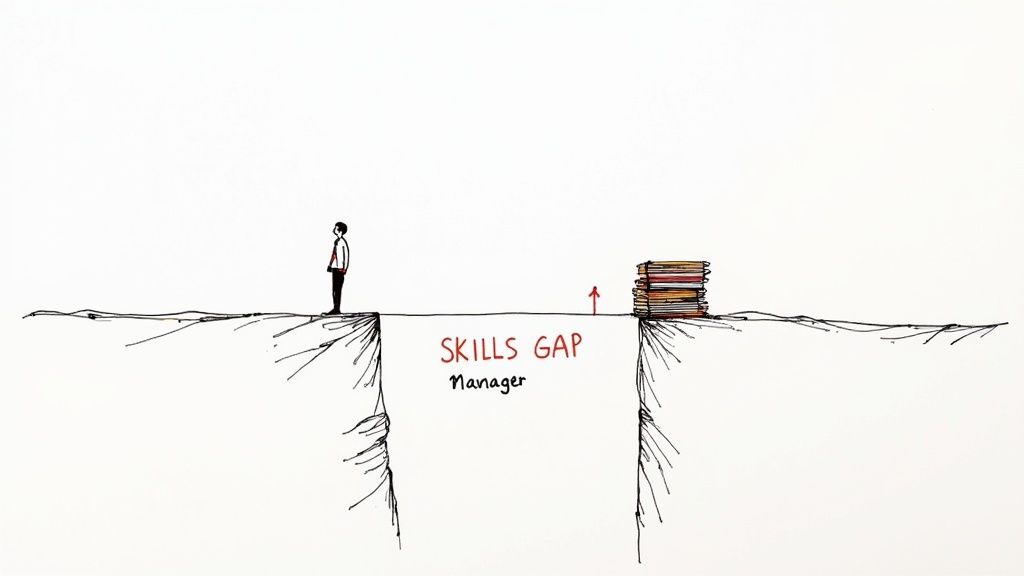
Have you ever seen a top performer get promoted into a management role, only to struggle? It’s a classic story. We often promote people based on their technical skills, then drop them into a leadership position without realizing that managing people is a completely different ballgame.
This isn’t about a personal failure—it’s a systemic one. The very skills that made someone an incredible engineer, salesperson, or marketer are rarely the ones that make them a great manager. This disconnect creates a massive confidence gap, leaving new leaders feeling totally unprepared for the human side of the job.
As workplaces evolve with more diverse teams and flexible work arrangements, the pressure on managers to have stellar people skills has never been greater.
The Real Cost of Underdeveloped Leaders
When managers are out of their depth, the fallout is swift and costly. An unprepared leader can unintentionally demotivate their team, create a toxic atmosphere, and watch their best people walk out the door. The business risk here is huge.
And this isn't a rare problem. Data from the ADP Research Institute's People at Work 2023 report highlights the scale of the issue: only 24% of global workers feel they have the skills needed for the next five years in their career. The problem is amplified at the leadership level, with a 2023 DDI report finding that 77% of organizations face leadership talent shortages.
These aren't just abstract statistics. They represent a clear and present danger to your company's health and bottom line. The skills gap is a business problem, not just an HR one.
From Risk to Resilience
Once you start seeing this skills gap as a business risk, the solution becomes clear. It’s not about pointing fingers at struggling managers; it’s about building a system of support to help them succeed. Investing in leadership development is one of the smartest moves you can make to build a more engaged and loyal workforce.
Giving managers practical training in communication, empathy, and conflict resolution helps them create psychologically safe teams where people genuinely want to be. This proactive approach doesn't just fix a problem—it builds a stronger leadership pipeline and a culture that top talent flocks to. You can find more related strategies in our guide on performance management best practices.
Investing in your managers' people skills is a direct investment in your entire workforce. When leaders are confident and competent, they create an environment where everyone can thrive, turning a potential weakness into a powerful competitive advantage.
Practical Strategies to Develop Your People Skills
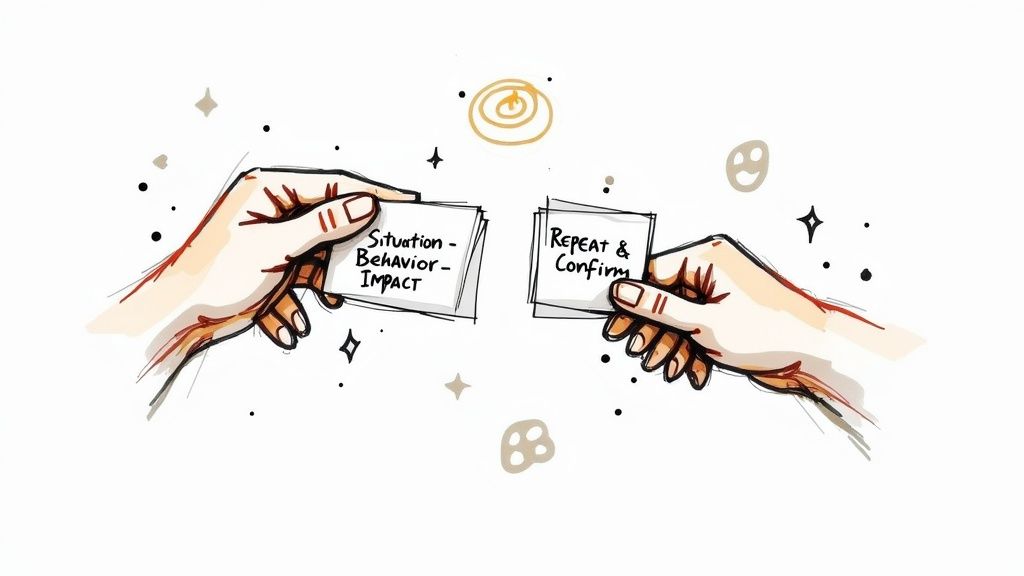
It’s one thing to know the theory behind people skills, but it’s another thing entirely to put it into practice. The best managers don't just attend a one-off training session; they treat skill development like a daily discipline. This means swapping abstract goals for concrete, repeatable techniques you can use right away.
Instead of just vowing to "be a better listener," you can adopt a proven method. These are the building blocks that transform good intentions into great leadership, creating real, positive changes in how your team works together.
Mastering Active Listening and Feedback
Of all the essential people skills for managers, clear communication is arguably at the top of the list. If you're looking for practical strategies to improve communication skills, let’s start with two foundational techniques you can implement today.
First up is the 'repeat and confirm' technique. It’s deceptively simple. After a team member explains an idea or a problem, just paraphrase it back to them. Something like, "Okay, so what I'm hearing is..." does two brilliant things at once: it ensures you've actually understood their point and proves you were paying attention.
Next, for giving feedback, try the 'Situation-Behavior-Impact' (SBI) model. This framework strips out the emotion and ambiguity that can make feedback feel like a personal attack.
- Situation: Pinpoint the exact time and place. "During this morning's team meeting..."
- Behavior: Describe the specific, observable action. "...you gave a really detailed breakdown of the project risks."
- Impact: Explain the result. "...and that helped everyone get on the same page. We all left feeling more confident about the plan."
Building Empathy and Resolving Conflict
Empathy isn't a superpower; it’s a skill you build. A great way to practice is through perspective-taking. Before your next one-on-one, spend just five minutes thinking about what's on that person's plate—their projects, their recent hurdles, and anything else that might be on their mind.
This little mental warm-up shifts your mindset from being just a manager to being a partner. You'll find yourself asking better questions and offering support that actually helps. It's this kind of effort that builds trust and psychological safety. And if you want to measure how you’re doing, you can explore different approaches for testing communication skills.
When disagreements pop up—and they always do—your job is to be the calm in the storm. Give each person a chance to speak without interruption. Then, steer the conversation toward a common goal. Ask something like, "What would a great outcome look like for both of you?" This simple question can shift the entire dynamic from finger-pointing to problem-solving, turning a moment of friction into a stronger working relationship.
To help you get started, here is a simple plan you can adapt to focus on the areas that matter most to you and your team.
Actionable People Skills Development Plan
| Skill Pillar | Self-Assessment Question | Development Activity | How to Measure Progress |
|---|---|---|---|
| Active Listening | Do I make assumptions or do I confirm understanding before responding? | Use the 'repeat and confirm' technique in at least 3 conversations this week. | Note the number of times you received a "Yes, that's exactly it!" confirmation from a team member. |
| Constructive Feedback | Is my feedback specific and focused on behavior, or is it vague and personal? | Deliver feedback using the SBI model during your next one-on-one meeting. | Ask for feedback on your feedback: "Was that helpful and clear?" Track team member responses over time. |
| Empathy | Do I consider my team members' perspectives before meeting with them? | Dedicate 5 minutes to the perspective-taking exercise before each one-on-one. | Notice if your conversations become more open and if team members volunteer more information without prompting. |
| Conflict Resolution | Do I jump to solutions or do I facilitate a discussion for mutual understanding? | The next time a conflict arises, act as a neutral facilitator, ensuring both parties are heard. | A successful outcome is when both parties agree on a path forward, even if it's a compromise. |
Turning these abstract skills into a reliable managerial toolkit is all about consistent, conscious practice. By using structured techniques like these, you're not just hoping to become a better leader—you're actively building the habits that make it happen.
The Business Case for Human-Centered Leadership
In a competitive market, it’s easy to focus on hard numbers, but the so-called "soft skills" deliver some of the hardest returns. People skills for managers aren't just about team morale; they directly impact the bottom line.
When leaders genuinely practice empathy, active listening, and coaching, the results are tangible. For example, a 2022 Gallup analysis showed that organizations with highly engaged employees experience 23% higher profitability and 18% less turnover than their peers with low engagement. The link between leadership and results is clear.
The market is waking up to this reality. The global demand for human skills training is projected to hit USD 47.16 billion by 2027, and a 2023 LinkedIn survey found that 9 out of 10 global executives now rank these skills as a top priority. Despite this, Deloitte’s 2023 Global Human Capital Trends report reveals a critical gap: only 64% of organizations say they are ready to meet future leadership needs, indicating many managers feel unprepared for roles that require judgment, empathy, and coaching. You can dig into the human skills training projections on Intuition for more detail.
“Investing in people skills isn’t a cost—it’s a strategic investment that fuels innovation and resilience,” says Dr. Sarah Kim, organizational psychologist.
This isn’t just theory. For instance, in one verified case study, a Fortune 500 tech company implemented an empathy-focused leadership program. Within one year, teams led by trained managers saw a 12% increase in customer satisfaction scores and a 15% reduction in employee attrition compared to control groups.
Linking Leadership to Financial Performance
Research from Zenger Folkman involving over 100,000 leaders found a direct link: teams led by managers with strong people skills are in the top 10% for employee engagement, which strongly correlates with higher productivity and profitability. These leaders don't just manage tasks; they cultivate a culture of continuous improvement and genuine collaboration.
This kind of leadership brings a cascade of benefits:
- Better Decisions: Diverse perspectives are actually heard, leading to smarter choices.
- Faster Problem-Solving: Open dialogue means issues surface and get resolved quickly.
- More Adaptable Teams: People feel safe to pivot and respond to market shifts.
Trust is the bedrock for all of this. Check out our guide on how to build trust in teams to see why it's so foundational.
Future Proofing Your Organization
Think of investing in people skills as a hedge against market volatility. As automation and AI become more common, the uniquely human skills of empathy and judgment become your competitive advantage.
Companies that develop empathetic leaders are better equipped to integrate new technologies without losing the critical human touch.
This approach also makes you a magnet for top talent. A 2023 McKinsey analysis found that companies in the top quartile for leadership effectiveness outperform their peers by doubling their total shareholder returns, which boosts retention and reduces recruitment costs.
Here’s how to start making it happen:
- Schedule regular, dedicated time for teams to reflect on their dynamics.
- Use data from pulse surveys to fine-tune your leadership training.
- Create peer coaching circles where managers can share what works.
According to research from Bersin by Deloitte, when organizations build human-centered principles right into their onboarding, new hires become fully productive 34% faster. That means lower ramp-up costs and a quicker boost to team performance.
By clearly quantifying the ROI of people skills, you shift the conversation. It’s no longer a “nice to have” but an undeniable strategic priority for any business that wants to thrive.
A Few Common Questions
It's one thing to talk about developing people skills, but it's another to actually put them into practice. As you start this journey, you're bound to have some questions pop up. Let's tackle a few of the most common ones I hear from managers.
Where Should I Even Start? What Skills Matter Most Right Now?
If you're new to management or just starting to get serious about this, focus on two things first: active listening and giving clear, constructive feedback. Everything else is built on this foundation.
Think about it—if you can't truly hear what your team is saying, you can't solve the right problems. Active listening builds the trust you need for everything else to work. From there, learning how to give feedback that actually helps people grow (instead of just making them defensive) is your next big win. Nail these two, and the rest will feel much more manageable.
How Do I Know If I’m Actually Getting Better at This?
It can feel a little abstract, but you can absolutely track your progress. You’ll want to look at both the "soft" feedback and the hard data. On the qualitative side, you can ask for direct feedback through anonymous surveys or have a trusted mentor observe you in meetings.
For more quantitative proof, watch your team's metrics. Are you seeing a drop in employee turnover? Are team engagement scores from pulse surveys ticking up? Are fewer conflicts getting escalated to you or HR? Those numbers don't lie—they're a direct reflection of how your skills are impacting the team.
Let's Be Honest, Can This Stuff Really Be Taught?
Yes, people skills are absolutely teachable. It’s a common myth that you're either born with them or you're not. While some people might have a head start, these are skills, not personality traits.
Think of it like learning to play guitar. You don't just pick it up and magically know how to play. You learn the chords, you practice your scales, and you get better over time. Frameworks like the SBI feedback model or specific active listening techniques are your "chords." Anyone can learn them with a little self-awareness and consistent practice.
Ready to build a stronger team from the ground up? MyCulture.ai provides the tools you need to assess culture fit and essential people skills, ensuring you hire managers who will lead with confidence and empathy. Start building your high-performing team today.